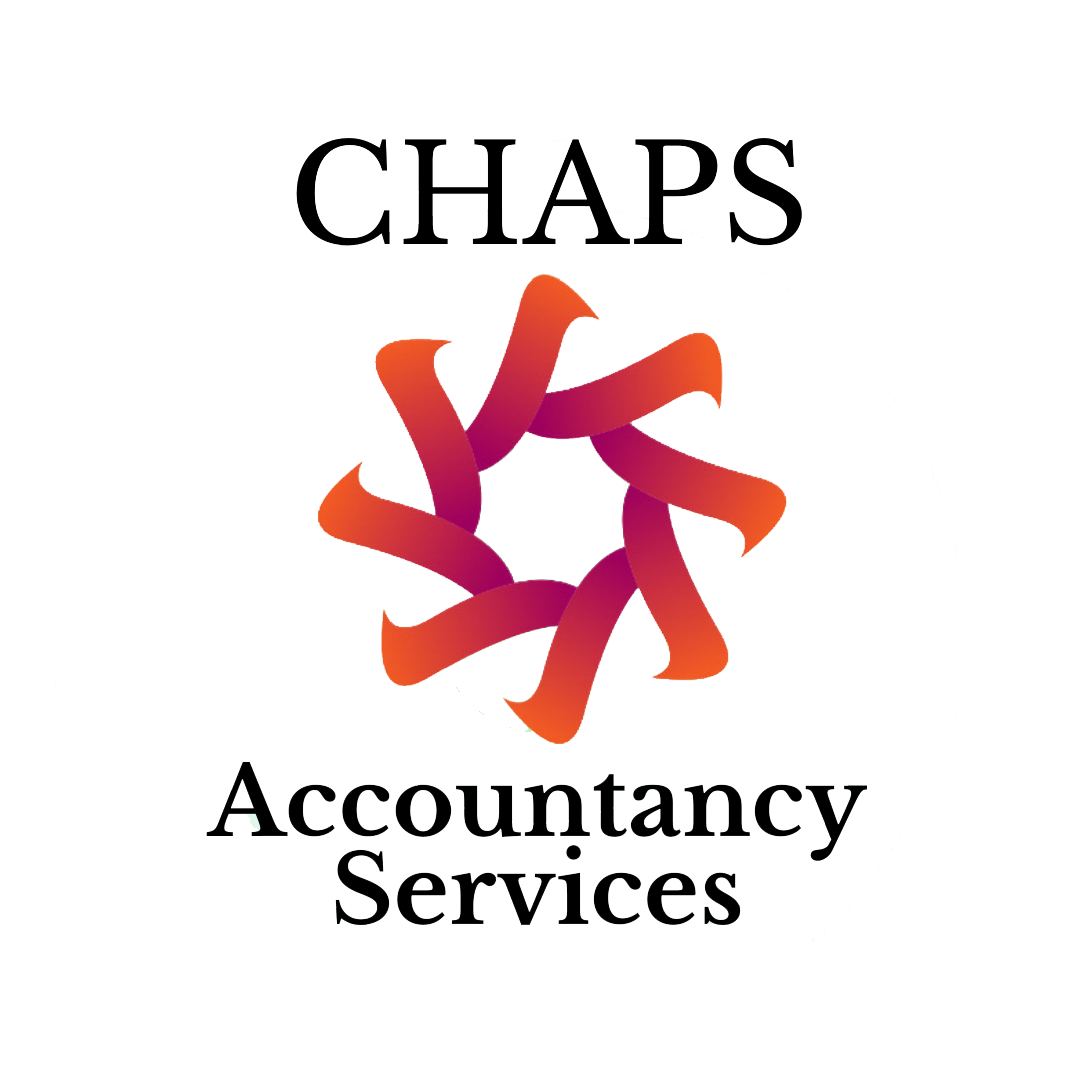Welcome to CHAPS Accounting Services
CAS's team of highly qualified Accountants, Bookkeepers and Payroll Executives have many years of combined experience, so let us put our skills into action while you concentrate on building your empire.
Whether you’re an established organisation looking for some Accountancy or Finance support, or a brand-new startup company, we’re here to help you not only to be cost efficient but give a phenomenal ON TIME accountancy services.
No matter the shape or size of your business - an individual sole trader, contractor, freelancer or a limited company - we have a comprehensive accountancy package just for you.
Our Services
At Chaps we offer a full range of services and products for all your Accountancy & Finance requirements:

CHAPS
Accountancy Services
- • Accounts Payable Services
- • Annual Accounts Preparation
- • All Payroll Solutions inc. (CIS)
- • Bookkeeping Services
- • Invoice Finance and Factoring
- • Business Advisory Services
- • Due Diligence and Compliance Services
- • Financial Accounting for Sole Traders,
Partnerships & Limited Companies - • Financial Statements Preparation
- • Management Accounts Preparation
- • New Business Start-up
- • Retirement Planning and Budgeting Services
- • Tax & VAT Returns

CHAPS
VAT Returns
Monthly returns completed by your lead accountant. Fully Making Tax Digital compliant VAT returns. Representation in the event of a HMRC investigation.

CHAPS
Accountancy Payroll Service
CHAPS fully understands the importance of having a fully compliant payroll solution to ensure business growth and more importantly employee/ candidate retention. Using CHAPS, you will have 100% peace of mind that you are in safe hands with educated payroll experts.

CHAPS
Business Finance Solutions
CHAPS understands one of the most important aspects of your business is cash flow. With 20 years of experience in recruitment, we understand the need for invoices to be paid on time and the difficulties this can bring if you fall behind.
Why you should work with us?
- Fully accredited and compliant Accountancy Services
- Your No1 choice for sourcing business finance
- Flexible weekly or monthly Payment Plans
- One of the most cost efficient Accountancy Services on the market
- New business startup support and education
- Access to online portal available for Accountancy clients
- Complete payroll solutions – PAYE Direct – True Umbrella – HYBRID PAYE
- Auto-enrolment - including pension & investment advice
- 24/7 service with a fully manned out of hours service for all our clients
What is outsourced payroll?
Simply put, payroll outsourcing is means hiring a third party company that specialises in payroll processing to handle the payroll for your busin...
What are the consequences of auto-enrolment non-compliance?
The Pensions Regulator has used enforcement powers in over 500,000 cases in the last decade as a result of employers failing to comply with auto-...
Frequently Asked Questions
-
What deadlines should I need to know?
As a limited company owner, you are expected to send accounts to Companies House within 9 months of your financial year end, and pay any corporation tax to the HMRC.
You must deliver the corporation tax (submit) to the HMRC within 12 months of your company year end.
-
What expenses can I put through my accounts?
Any expenses that relate to the activity your business is involved in are allowed to be included in your company accounts.
However there are some expenses that relate to employees and director’s expenses that are also allowable.
Head over to our resources page to download our expenses guide.
-
How much is corporation tax?
Corporation tax was increased to 25% in 2023 in line with Budget announcements, for businesses with taxable profits above £250,000. Businesses between £50,000 – £249,999 will have a corporation tax rate between 19% and 25%. You can find out more about this in our guide on what is corporation tax.
-
How should I store my receipts electronically?
We would always recommend that you use a cloud accounting package like Sage, and it’s receipt capture software Auto Entry because it’s accessible anywhere with an internet connection – even on your phone! Using the Auto Entry app on your smartphone, you can photograph your receipts and it will put them into Sage for you along with a copy of the image, so it’s easy to refer to when you need to find a receipt!
-
What is the best way to do bookkeeping?
Monthly banking reconciliation - We start with this pointer as an absolute must for good bookkeeping. Every month, you must check your books against your bank statements (with no exception, and no relying on automation tools).
If you do this you’ll catch any problems early, before they become a major headache. This includes spotting any unusual transactions or activity.
Snap your receipts there and then, Be honest, can you be found under a mountain of paperwork at the end of the tax year? Are you scrabbling around in a frantic blur of sorting receipts?
I’ll move onto that intimidating mound of papers next, but as for your receipts – don’t delay recording them. Virtually everyone has a smartphone with a camera — the solution is right there in your pocket!
Use the cloud - Still not made it to the cloud? Stuck with those piles of paper? Not only are you missing out on real-time business insight, you’re also spending WAY too much unnecessary time on your books.
Crystal-clear understanding of allowable expenses - Bookkeeping in the cloud is smart but (for now at least), processing your allowable expenses is still down to you.
Know those due dates WELL in advance - Filing dates, invoice due dates, regular bills – the due dates you need to know about are endless – so it makes sense to set up some automated reminders.
-
How often should I do bookkeeping?
Ideally you should complete your bookkeeping no less than monthly, but we prefer to do it for our clients on a weekly basis at the very least.
For the majority of our clients, CHAPS do this daily to ensure whenever they need information, they have it at their fingertips. No one likes waiting for key information!
-
How long do I have to keep my bookkeeping records for?
The HMRC require business owners to keep records of their income and expenditure, including copies of your receipts for at least 5 years after the financial year has ended. This is so that if they need to enquire or investigate your finances, they will still be able to see the documents to back up the information you’ve submitted. Major headache, we know! Up until the invention of online accounting, these needed to be kept as hard copies which would take up considerable space inside your business or home. Now the HMRC are happy with electronic copies which will only take up space on your hard drive or cloud storage solution space.
-
Does my bookkeeper need to be local?
No! Using cloud accounting software, such as SAGE, means that modern bookkeepers (CHAPS)can manage your business finances in real-time from OUR own office, rather than you having to wait for them to go into your office.
We can access your finance information from our own office and keep your books accurate and up-to-date at all times, which in turn helps you make better business decisions, and we can identify and resolve any issues as soon as they arise. Find out more about our bookkeeping service here.
-
How often does my company have to file a confirmation statement?
A confirmation statement should be filed once a year (annually) and will coincide with the date that the company was formed with companies house.
Companies house charge £13 a year for a confirmation statement to be filed. This fee just covers the confirmation statement itself, and not the cost of someone other than you completing it. A company secretarial service will often charge a fee to manage this for you, including the fee levied by companies house.
-
What information is included in the statutory registers?
All companies are required by law to keep and maintain up-to-date registers of key details.
These include:
- a register of members (shareholders),
- a register of directors,
- a register of charges (for things like mortgages or finance agreements that require a guarantee),
- a register of persons with significant control (PSC register).
The details in these registers include (but are not limited to) names, addresses, dates of appointment and resignation for company directors. The details for members (shareholders) include the number and type of shares held.
Failure to keep the registers up-to-date can incur a penalty of up to £5,000.
A company may choose to keep its directors’ home addresses private and to record a service address for them. If so, it will need to keep an additional register showing the directors’ residential addresses, which cannot be seen by the general public.
-
What is included in management accounts?
This depends on where your business is at in it’s lifecycle, what sector it’s in, and the goals that you want to set for the business.
Typically management accounts will include:
Key performance indicators (KPIs)
Profit & loss report
Balance Sheet
Cash flow
Whilst these are the usual things to include in a management report, it can be customised to what you want to see and how you want to see it.
We build custom reports in SAGE for some of our clients, that reflects the information they want and need to see.
-
How do I read and understand management accounts?
Reading management accounts can be complicated, and without proper guidance, they simply join the pile of paperwork on your desk.
One tip we often say is to think beyond the accounting details. Ask yourself – where does my business make its money? Is it a particular service or good sold? If so, are you splitting this out so you can track its activity each month?
How are you monitoring the performance of your team? Some measure activity levels, whilst others may monitor output.
Aim to identify no more than 5 key performance indicators (KPIs) that you would like to monitor. They don’t need to be all financial. Think about other parts of the business too, such as the time taken to pick an item of stock, or how quickly a service can be turned around from the job coming in, to being finished for your customers.
-
What self assessment deadlines do I need to know?
The deadlines for self assessment that you should be aware of are:
5 October – deadline to register for self assessment for the first time.
31 October – paper return deadline
31 January – online filing of tax return deadline
31 January – tax payment deadline
-
How much is self assessment tax?
Self assessment tax rates are the same as being employed, so 20%, 40% and 45%.
Where self assessment differs is with national insurance. When self employed, you typically pay national insurance at two different rates.
Class 2 – £3.05 per week (frozen in the Budget 2021)
Class 4 – 9% on profits between £9,501 and £50,000 and 2% on profits over £50,000 (profits between £9,568 and £50,270 from 6th April 2021)
-
What is the rate of VAT in the UK?
The standard VAT rate is 20%, which covers most services and goods sold in the UK.
However there are some goods and services that attract VAT at different rates, including 0%, 5% and exempt for VAT.
-
What is the VAT registration threshold?
The threshold for registering for VAT is £85,000.
If your VAT-able sales (sales that would normally attract VAT and are not exempt) are more than £85,000 in a 12 month period, then you are required to register with the HMRC as soon as you become aware.
BREXIT has brought in some further VAT thresholds that may also affect your business.
You’re required to register for VAT or join a VAT accounting scheme from 1st January 2021 if:
Flat Rate Scheme – £150,000 of sales or less.
Cash Accounting Scheme – £1.35 million of sales or less.
Annual Accounting Scheme – £1.35 million of sales or less.
-
What deadlines should I know about?
VAT returns must be filed one month and 7 days after the period end. Payment must also be made by this deadline too.
If you are signed up to pay your VAT by direct debit, you are given a few more days to pay (usually around the 10th instead of the 7th).
-
How can an accountant (CHAPS) help me with my UK VAT returns?
VAT is a constantly changing tax that involves vast amounts of knowledge to stay compliant.
An accountant is required to undertake regular training to ensure their knowledge is current and up to date, which is to make sure they are competent in their role as your adviser.
CHAPS can help you by dealing with the complexities of VAT, along with dealing with the HMRC so you don’t have to. We will also help you keep your business compliant and take the administrative burden of VAT off your shoulders.

